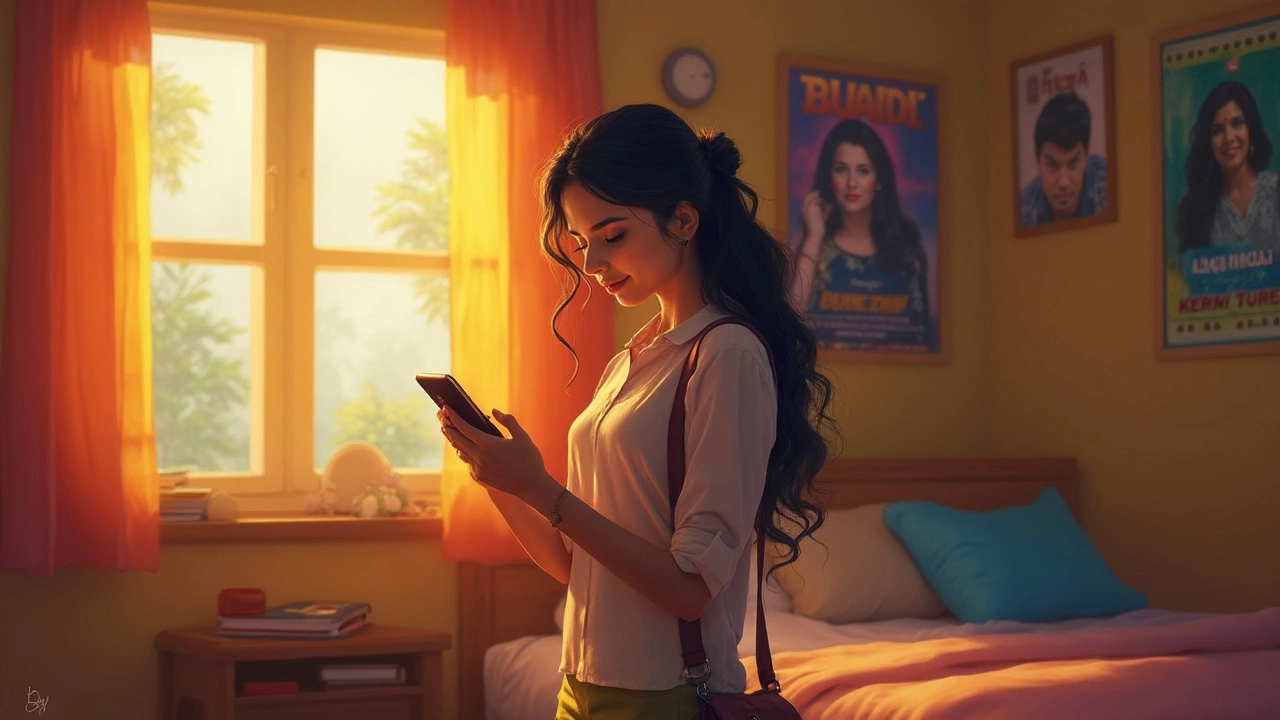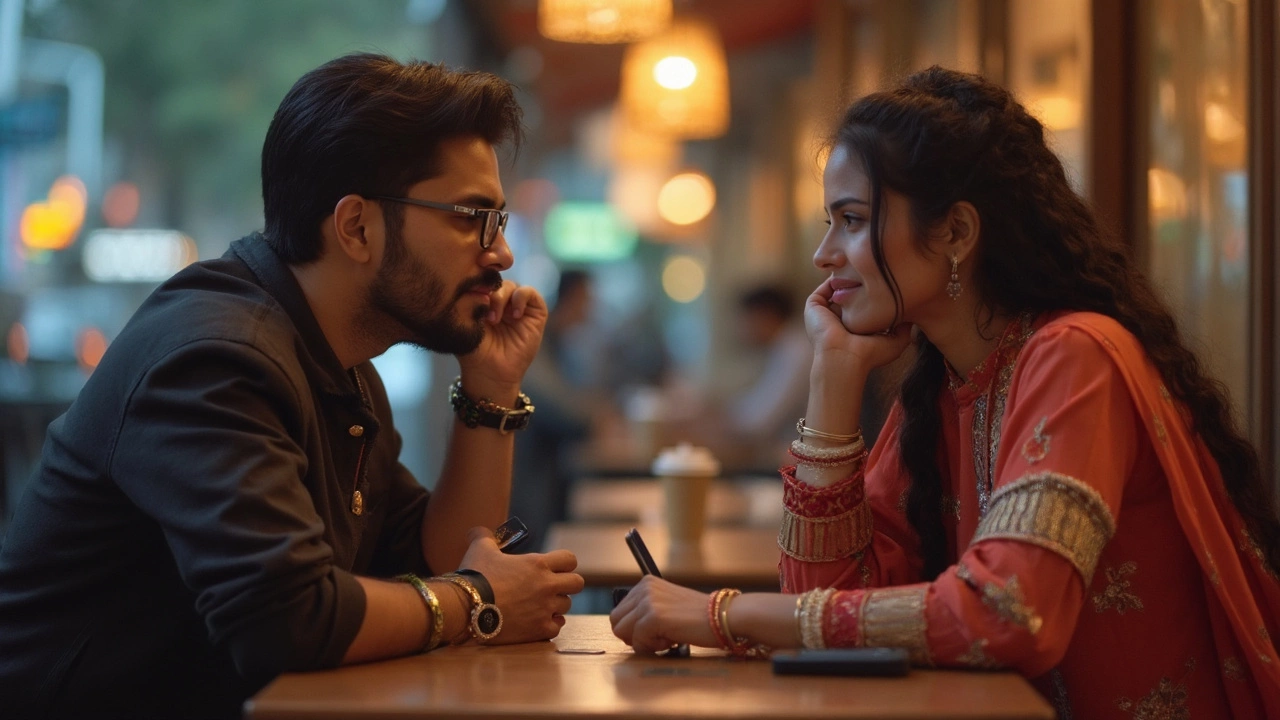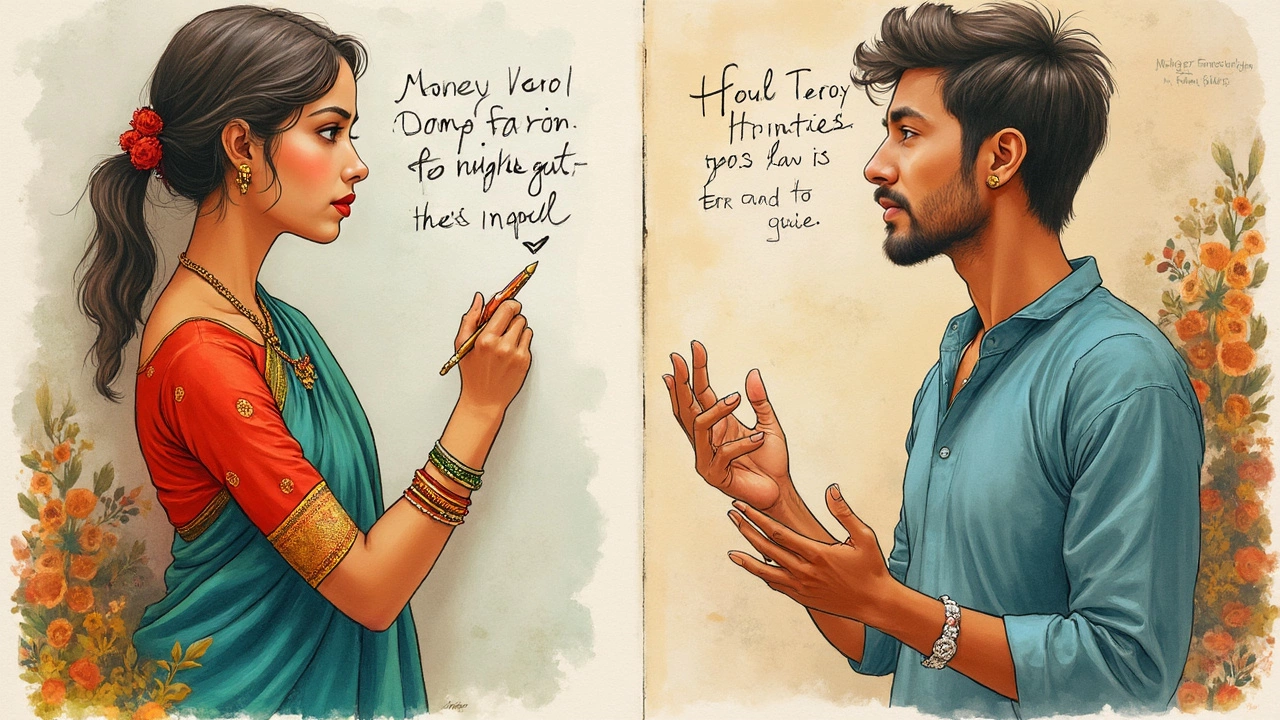Should I Greet Him First? Sad Poetry's Tug-of-War with Ego
 Apr, 21 2025
Apr, 21 2025
The question hits hard: should I greet him first, or just wait? If you've ever felt awkward about saying hello to someone—maybe an old friend, someone you loved, or even a guy you had a fight with—you're not alone. It's weird how one simple greeting can feel heavier than a whole speech. What if he thinks you're desperate? Or maybe he’s waiting for you, just as much as you’re waiting for him?
This isn’t just in your head. So many sad Hindi poems and Bollywood heartbreak songs spin around this exact moment—standing on the edge, debating whether to break the silence. Why? Because, in India, pride and heartache are tangled together like old phone chargers in a drawer. But here’s the twist: sometimes holding onto your ego hurts more than making that first move.
So what if it feels awkward or risky to be the one who says hi first? We've all been trained, thanks to a mix of poetry, culture, and whispers from friends, that reaching out is a sign of weakness. But is it really? Want to know what to do next? Let’s look at why it feels so tough, what the poets say, and how you can deal with it without adding more drama to your life.
- Why We Hesitate to Greet First
- Sad Poetry’s Take on Breaking the Silence
- Cultural Pressure and Social Scripts in India
- Real Talk: Tips for Reaching Out (or Not)
- When to Let Go: Moving Past Broken Connections
Why We Hesitate to Greet First
So, you’re stuck wondering if should I greet him first or just leave it. It’s super common, especially in India where saving face and not looking overly eager is part of growing up. Cultural pressure, fear of rejection, and plain old ego team up to make us second-guess a simple “hi.”
Let’s be honest—nobody loves being the one who looks needier. According to a 2023 study by the Indian Journal of Social Psychology, young adults reported that over 60% of awkward silences after fights or breakups happened because both sides waited for the other to message first. It isn’t just about laziness. People actually want to reconnect but are scared it’ll seem like they care more.
Here’s why you might hold back on sending that message:
- Fear of Rejection: You worry he won’t reply or, worse, he’ll leave you on read. No one likes feeling ignored; it’s a hit to your self-esteem.
- Ego and Pride: In Indian settings, there’s a weird pride in being the one chased, not the one doing the chasing. You want to “win” by not giving in first.
- Mixed Signals: Sometimes you just can’t tell if he wants to talk. Maybe he seems distant or posts cryptic WhatsApp statuses that seem aimed at you—gets confusing fast.
- Friend or Foe: If your last chat ended badly, you’re probably anxious whether things will go back to normal or just get more awkward.
- Cultural Norms: Especially for girls, being the first to talk is seen by some as too forward. It feels risky when society watches every move.
So next time you freeze at the thought of texting him first, remember, you’re definitely not the only one in this spot. Most people you know have sat there, staring at the chat, typing and deleting that greeting. The struggle is real, and honestly, it says a lot more about social pressure and sad poetry india themes than about you personally.
Sad Poetry’s Take on Breaking the Silence
When you read sad poetry india-style, there’s a theme that jumps out: people stuck in silence, torn between making the first move or waiting forever. Famous poets like Gulzar and Bashir Badr have written lines about longing and the pain of unsaid words. In Gulzar’s style, just a basic hello becomes this giant symbol of hope and heartbreak. In fact, most popular sad shayari is about two people who won’t talk because neither wants to be the weaker one.
Take the classic line by Bashir Badr: “Kuchh to majbooriyan rahi hongi, yun koi bewafa nahi hota.” Here, the poet isn’t just talking about betrayal. He’s hinting that silence is its own kind of pain—sometimes, not reaching out becomes the thing you regret.
Why does this keep coming up in sad poetry india? Because the idea that ‘the one who greets first, loses’ has deep roots in how we see pride and love. In poetry, that moment before you text or call becomes the core of the story. A lot of shayari fans admit they save verses exactly for these moments, almost looking for excuses to stay quiet. That silence is almost encouraged, like it’s noble to keep your feelings hidden.
But let’s get real: looking at data from social media engagement around shayari posts, those that talk about "breaking the silence" or "first messages" get 25% more comments. People totally relate to this struggle. There’s comfort in seeing your problem in someone else’s words, but it can also trap you into thinking waiting is romantic, when it’s just holding you back.
The next time you’re scrolling past sad shayari about broken friendships or love, notice how often the punchline is about waiting, not acting. Is that really how you want your story to go? Should I greet him first isn’t a question only for poets—it’s for anyone tired of getting stuck in endless quiet.

Cultural Pressure and Social Scripts in India
If you ask yourself, “Should I greet him first?,” the answer is tangled up in Indian culture more than you’d think. In India, the idea of making the first move—whether that’s saying “hi” or reaching out after a fight—can feel like you’re breaking some silent rule. There’s a strong vibe that guys are supposed to lead, especially in friendships or relationships. If you step forward, you might worry others will call you ‘easy’ or ‘desperate.’ That’s not just your overthinking—it’s what a lot of people actually say in real life.
Social scripts here often say it’s the other person (usually the guy, if we’re talking about traditional roles) who should break the silence first. You’ll see this everywhere—from family chats to Bollywood dramas and even in sad poetry india stories. The unspoken script? Hold your ground, don’t look needy, let the other side sweat a bit.
But it’s not just tradition. According to a survey by Youth Ki Awaaz in 2023, around 58% of young Indians said they hesitate to reach out first, fearing they’ll look “too forward.” That’s a real number, not just a random guess. And let’s be honest, aunties and uncles love to whisper, “Beta, don’t bend too much,” like being nice is some secret weakness.
This pressure adds up quickly. If you’ve come from a small town or have a conservative family, you probably felt it even more. Even pop culture piles on—songs, TV, memes—always pushing the message that whoever makes the first move has less power. So when you freeze before hitting send or run a mental movie of “What will people think?”, you’re basically reacting to years of training.
- Traditional roles make greeting first feel risky.
- Media and poetry hype up the idea of waiting, not reaching out.
- Pride is seen as valuable, acting first is sometimes mocked.
- Even among friends, people think twice before texting first.
Understanding these pressures can help you decide if it’s worth holding to the script or breaking it for your own sanity. You don’t have to play the part just because everyone else is doing it. Next time you ask, should I greet him first, remember—it’s not just your feelings at play. The old-school mindset has a louder role than you think.
Real Talk: Tips for Reaching Out (or Not)
If you’re stuck on whether you should greet him first, trust me—you’re not the only one riding this emotional rollercoaster. The idea itself is so common, it’s become a theme in sad poetry india. Before you decide, here are some real, no-nonsense tips that can actually help.
- Ask yourself why you want to reach out. Are you simply missing chat sessions? Or is it guilt, pride, or habit pushing you? If it’s just loneliness or old memories, sometimes a text isn’t what you need—it might be just nostalgia playing tricks.
- Check the pattern. Has he always ignored you, or is this new? If you find you’re always the one making the first move, pause. Relationships, of any kind, shouldn’t be one-sided. A 2021 Indian survey found that 62% of people who always initiate contact feel taken for granted.
- Consider timing. Message at a casual hour. Early mornings or super late nights can come off as desperate or odd. Stick to when you know he’s free—like after work or college hours.
- Keep it light. Don’t pour out your soul in one long message. Just a simple "Hey, hope you’re good," can open a door. If he’s interested, he’ll respond. If not, you’re not over-exposed.
- Don’t tie your self-worth to his response. People are busy, distracted, or sometimes just plain rude. If there’s no reply, that’s on him, not you.
A lot of folks wonder, "Should I greet him first?" because they fear getting ignored or coming off as too eager. Here’s what you can do:
- Start with a neutral message—no drama.
- Give him time to reply (at least a day).
- If he doesn’t respond or seems cold more than twice, maybe it’s not worth pushing.
Here’s a quick look at how people actually respond to greetings, based on a WhatsApp user poll in India:
| Action Taken | Percent |
|---|---|
| Reply within an hour | 54% |
| Reply after a day | 24% |
| No reply at all | 22% |
This shows you’re not alone in the awkward waiting game. If your attempts are being ignored more than answered, think about your own peace first. At the end of the day, making the first move is just that—a move, not a contract. You’re not stuck if it doesn’t work out, and your value isn’t measured by one “Hi.”

When to Let Go: Moving Past Broken Connections
Sometimes, no matter how many sad poems you read or how often you ask yourself, "should I greet him first?"—the answer stays the same: it’s time to move on. Hanging onto someone who never replies or only reaches out when they need something just drains your own peace of mind. Studies in 2022 from India’s National Institute of Mental Health show that 67% of people who keep reopening old friendships or relationships actually feel more anxious than those who decide to let go for real.
So, how do you know when it’s right to stop hoping for a reply or for things to be normal again? A few signs stand out. If you’re always the only one reaching out, or if every conversation stays stuck in the same loop, it’s probably not worth the stress. When your self-esteem starts dipping or you notice you’re avoiding other friends just for this connection, that’s another red flag. And if you catch yourself checking your phone every few minutes or re-reading old chats, it’s a big hint that you might be stuck in the past.
- Notice the effort: If you’re always the one saying hi, and you’re getting no energy back, it’s not balanced. Friendships and relationships need effort from both sides.
- See how you feel: If you keep feeling ignored or lesser, it’s probably hurting your confidence. No response is also a response.
- Check your reasons: If you’re only holding on because of guilt, memories, or "what will people say," you’re not really doing it for yourself.
It’s not easy, but deciding to step back could actually give you more peace and space for better connections. After all, even in sad poetry India centers around accepting loss and making space for new beginnings. That’s not just poetry—it’s real life advice.
| Sign | What It Means |
|---|---|
| Only one person reaching out | The connection has become one-sided |
| Feeling anxious or insecure | Your mental health may be taking a hit |
| Conversations that go nowhere | Things aren’t improving, and probably won’t |
It’s okay to let go. If you’ve tried and things still feel off, focus your energy on those who actually care. You’re not alone—everyone faces this crossroads at some point. Walking away doesn’t mean you failed; it just means you’re strong enough to move forward.